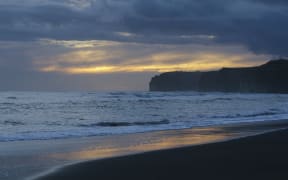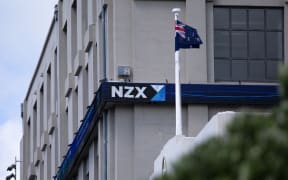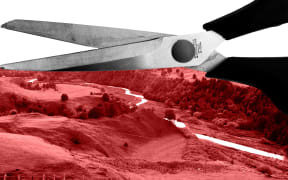
Ministers Chris Bishop, Simeon Brown and Shane Jones will have the final say on whether projects in line for consideration under the government's Fast-Track Approvals Bill will be given the green-light or not. Photo: RNZ / Angus Dreaver
Labour is warning that allowing just three ministers the last word on fast-tracking infrastructure projects opens them up to accusations of bias, especially when political donations might muddy the waters.
Environment spokesperson Rachel Brooking said they had identified at least two businesses on the government's list of organisations invited to apply for fast-tracked consents, which have donated to National.
The law change will give three ministers - Chris Bishop, Simeon Brown and Shane Jones - the ability to green-light roads, dams and mines, whether or not their approval is recommended by an expert panel, risks biodiversity, or has previously been denied consents by the courts.
She said it was a risky position for ministers to put themselves in.
"They're actually making the decisions," she said. "That then in turn opens them up to allegations of improper behaviour if they've had donations made by those different players. So it's a very strange thing for the ministers to want to open themselves up to."
The legislation is still being considered by the select committee, and the list of projects to be pushed through for consideration by the ministers is not finalised.
Two hundred names were on the government's list of companies and iwi it sent letters to, providing information on how to apply for fast-track consents.
Some companies had taken this as an invitation.
But Bishop has been consistently quick to point out that being a recipient of the letter did not necessarily mean an organisation would be putting forward a project.
He said it was a catch-all list, and included everyone he had corresponded with.
RNZ understands a number of iwi groups were included on the list because they were consulted on whether the bill threatened treaty rights, rather than because they had a project which might make the list.
Bishop has defended his inclusion of those groups on the list.
"If I hadn't included them, I would probably be being accused of leaving people out," he said. "There will be people on that list who oppose the fast-track process, there will be people or companies on the list who strongly support it, there will be people who don't care either way, I suspect."
'Open to sensible improvements' - Bishop
Bishop told Morning Report the bill was built on the bones of the Labour government's fast-track bill and it was odd for them to "decry" it.
He said the coalition government was making the bill more transparent.
Bishop said it was a "safeguard" where ministers could override the advice of an expert panel, if they deemed the conditions on a project "too onerous".
"We can have that debate through the Select Committee process.
"It's now gone to the committee. We'll wait and see what the committee comes up with.
"Of course we're open to sensible improvements to the bill."
He said the list of 200 companies was created after they had contacted the government for more details about the bill.
"It's not an invitation. It's a courtesy letter during the initial stages of the fast-track development."
The letter outlined the application process to businesses that indicated they wanted to be involved, he said.
He said the public would find out about decisions on projects after the ministers had made them.
Meanwhile, an environmental group is warning the legislation could breach New Zealand's international trade agreements.
Environmental Defence Society chief executive Gary Taylor said New Zealand was party to a number of international agreements on climate change, preventing coal extraction, and switching to renewable energy.
"If you are an export company in New Zealand, you should be having a careful think about what harm being associated to all of this is doing to your export market."
Public submissions for the bill closed on Friday, only hours after the minister released his list of correspondents.
The public and private sectors have until 3 May to submit a project for a spot on the list.








